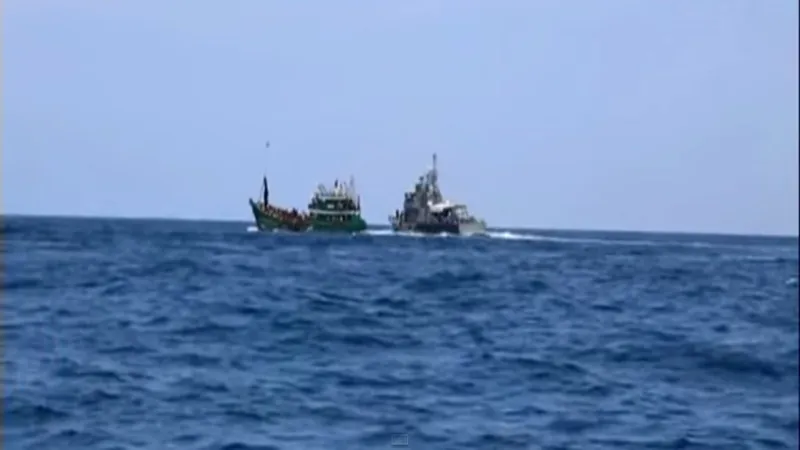-
CENTRES
Progammes & Centres
Location
The region need to response to the unfolding migrant crisis in the Andaman Sea. India and the Indian Navy must move quickly with other regional players to bring an end to the humanitarian crisis in the Bay of Bengal.

The horrific pictures of migrants cramped in rickety smugglers' boats adrift on the Andaman Sea are sending shock waves around the world. Asia has seen crises involving "boat people" before; but the one currently unfolding involves an ethnic group little known in the region, let alone the world - the Rohingyas, a minority Muslim community from Myanmar who have been discriminated against and persecuted for years.
There are three dimensions to this disturbing development that need to be understood and addressed. The first relates to the factors pushing vulnerable communities to undertake dangerous sea voyages; the second is the economy of human trafficking in the Bay of Bengal; and the last relates to regional policies toward migration and refugee flows. All these elements are present in the humanitarian tragedy that is under way in the Bay of Bengal.
The status of the Rohingyas has long been a controversial issue in Myanmar. Denied citizenship by successive governments and accused of being 'illegal immigrants' from Bangladesh, Rohingya Muslims - whose numbers are thought to be around one million — have been fleeing the country for decades.
Myanmar's democratic transition process that began in 2011 has only complicated the situation. The country witnessed one of the worst bouts of communal violence in its recent history when renewed riots between the majority Buddhist community and the Muslim Rohingyas broke out in 2012, resulting in hundreds of people killed, mostly Rohingyas, and hundreds of thousands displaced.
Over 140,000 Rohingyas are today in displaced persons' camps, and more than 120,000 have boarded boats to flee Myanmar to Bangladesh and other neighbouring countries. Some refugees have tried returning home, but there is little to reassure them about their future in Myanmar.
Not only has there has been no sign of any significant steps taken to bridge the communal divide, on 1 April, 2015, the Myanmar government formally withdrew the temporary ID cards extended to the Rohingyas, thereby stripping them of voting rights since their enfranchisement is linked to the ID cards.
By all accounts, the scale of human trafficking has been on the rise in the Bay of Bengal the past few months. According to a UN refugee agency report released in May, an estimated 25,000 Rohingyas and Bangladeshis boarded smugglers' boats between January and March this year, double the number compared to the same period of last year.
Human trafficking is a complex issue involving transnational syndicates and has emerged as a lucrative business. The authorities in Thailand were allegedly aware of these smuggling rings, but did nothing for so long.
From the accounts of survivors, we now have growing information about the modus operandi of human traffickers in the Bay of Bengal region. People are transported from either Myanmar's Rakhine state or Bangladesh's Cox's Bazar area by bigger ships to disembark in Thailand's Ranong area in the south from where they are taken by road to smugglers' camps near Thai-Malaysian border to be 'sold' to other traffickers. The whole journey takes several weeks without proper arrangements for food and water.Earlier this month, the Thai authorities discovered more than 30 bodies in smugglers' camps in the southern province of Songkhla, close to the border with Malaysia. The bodies are believed to be of Rohingyas and Bangladeshi migrants who may have died from illness or abuse.
The Thai crackdown on human smugglers meant that the traffickers had to resort to other routes as the normal passage was effectively closed. As it became more difficult to land ashore in Thailand, the smugglers either resorted to offloading their human cargoes in Malaysia or Indonesia, or even abandoning their boats and letting them drift. The International Organization for Migration estimates there could be more than 8,000 migrants from Bangladesh and Myanmar still stranded at sea.
The cruel policy of pushing boats back to sea by Malaysia and Indonesia has made matters worse in the current migrant crisis. As the abandoned boats drift near their shores, the Malaysian and Indonesian navies have been towing the vessels back to sea. What has been described as "maritime ping-pong" is risking the lives of thousands of human beings, many of them suffering from dehydration and seasickness.
In the wake of the growing international focus on the issue, the Thai government has called for a regional meeting to address the migrant crisis on 29 May involving 15 nations. These include Bangladesh, Myanmar, Indonesia, Malaysia, hosts Thailand as well as Australia, and the United States.
The Thais wants the root causes of the flow of migrants to be discussed in the meeting. However, the Myanmar government has said it will boycott the meeting and has accused Thailand of deflecting the pressure it is under for its own weakness in preventing human trafficking.
This blame-game is not going to help matters at all. While there is need for a more humane regional policy towards migrants and refugees, particularly, in providing safety and protection, it is clear that all governments must work together to crack down on human traffickers as these issues require a regional approach.
As the current migrant crisis comes under further regional and international scrutiny, Myanmar needs to recognise that its transition will be judged by how it treats its minority communities.
Rather than boycotting the regional meeting, Myanmar must take the opportunity to work with regional and international players to find ways to resolve the issue. By snubbing the meeting, it is only making itself the villain in the eyes of the international community.
With the UN backing the Thai initiative for a regional meeting, the regional and international community needs to immediately initiate a search and rescue operation to save the lives of the thousands of migrants and refugees who have been abandoned by people-smugglers off the coasts of Thailand, Malaysia and Indonesia.
The Indian Navy has been involved in several relief and rescue operations in the Bay of Bengal in the past. India has recently played a key role in the aftermath of the devastating earthquake that hit neighbouring Nepal. The current humanitarian crisis in the Bay of Bengal presents an opportunity for India to play a similar role.
(K. Yhome is a Fellow at the Observer Research Foundation, New Delhi. He can be reached at yhome@orfonline.org )
Courtesy: The Wire, 21 May, 2015
The views expressed above belong to the author(s). ORF research and analyses now available on Telegram! Click here to access our curated content — blogs, longforms and interviews.

K. Yhome was Senior Fellow with ORFs Neighbourhood Regional Studies Initiative. His research interests include Indias regional diplomacy regional and sub-regionalism in South and Southeast ...
Read More +